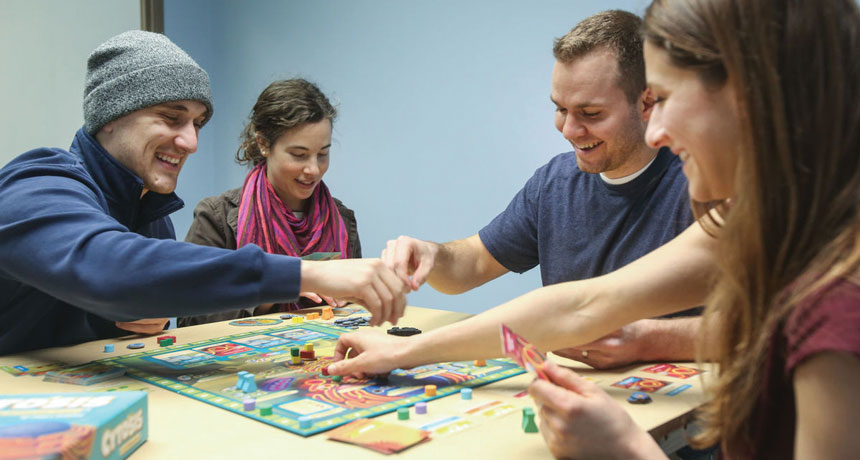Why a chemistry teacher started a science board game company

A physicist, a gamer and two editors walk into a bar. No, this isn’t the setup for some joke. After work one night, a few Science News staffers tried out a new board game, Subatomic. This deck-building game combines chemistry and particle physics for an enjoyable — and educational — time.
Subatomic is simple to grasp: Players use quark and photon cards to build protons, neutrons and electrons. With those three particles, players then construct chemical elements to score points. Scientists are the wild cards: Joseph J. Thomson, Maria Goeppert-Mayer, Marie Curie and other Nobel laureates who discovered important things related to the atom provide special abilities or help thwart other players.
The game doesn’t shy away from difficult or unfamiliar concepts. Many players might be unfamiliar with quarks, a group of elementary particles. But after a few rounds, it’s ingrained in your brain that, for example, two up quarks and one down quark create a proton. And Subatomic includes a handy booklet that explains in easy-to-understand terms the science behind the game. The physicist in our group vouched for the game’s accuracy but had one qualm: Subatomic claims that two photons, or particles of light, can create an electron. That’s theoretically possible, but scientists have yet to confirm it in the lab.
The mastermind behind Subatomic is John Coveyou, who has a master’s degree in energy, environmental and chemical engineering. As the founder and CEO of Genius Games
, he has created six other games, including Ion ( SN: 5/30/15, p. 29 ) and Linkage ( SN: 12/27/14, p. 32 ). Next year, he’ll add a periodic table game to the list . Because Science News has reviewed several of his games, we decided to talk with Coveyou about where he gets his inspiration and how he includes real science in his products. The following discussion has been edited for length and clarity.
SN: When did you get interested in science?
Coveyou: My mom was mentally and physically disabled, and my dad was in and out of prison and mental institutions. So early on, things were very different for me. I ended up leaving home when I was in high school, hopscotching around from 12 different homes throughout my junior and senior year. I almost dropped out, but I had a lot of teachers who were amazing mentors. I didn’t know what else to do, so I joined the army. While I was in Iraq, I had a bunch of science textbooks shipped to me, and I read them in my free time. They took me out of the environments I was in and became extremely therapeutic. A lot of the issues we face as a society can be worked on by the next generation having a command of the sciences. So I’m very passionate about teaching people the sciences and helping people find joy in them.
SN: Why did you start creating science games?
Coveyou: I was teaching chemistry at a community college, and I noticed that my students were really intimidated by the chemistry concepts before they even came into the classroom. They really struggled with a lot of the basic terminology. At the same time, I’ve been a board gamer pretty much my whole life. And it kind of hit me like, “Whoa, wait a second. What if I made some games that taught some of the concepts that I’m trying to teach my chemistry students?” So I just took a shot at it. The first couple of games were terrible. I didn’t really know what I was doing, but I kept at it.
SN: How do you test the games?
Coveyou: We first test with other gamers. Once we’re ready to get feedback from the general public, we go to middle school or high school students. Once we test a game with people face-to-face, we will send it across the world to about 100 to 200 different play testers, and those vary from your hard-core gamers to homeschool families to science teachers, who try it in the classroom.
SN: How do you incorporate real science into your games?
Coveyou: I pretty much always start with a science concept in mind and think about how can we create a game that best reflects the science that we want to communicate. For all of our upcoming games, we include a booklet about the science. That document is not created by Genius Games. We have about 20 to 30 Ph.D.s and doctors across the globe who write the content and edit each other. That’s been a real treat to actually show players how the game is accurate. We’ve had so many scientists and teachers who are just astonished that we created something like this that was accurate, but also fun to play.